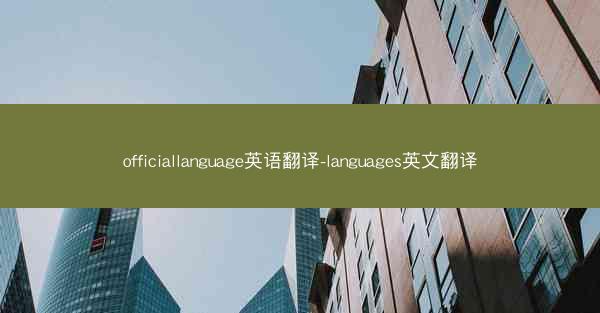officiallanguage英语翻译-languages英文翻译

Official Language English Translation - Languages English Translation
In the globalized world we live in today, the importance of language cannot be overstated. One of the key aspects of language is the concept of an official language, which is often translated into English as official language. This term refers to the language that is recognized by a government as the primary language for official purposes. In this article, we will delve into the concept of official language English translation and explore various aspects of languages English translation, aiming to provide a comprehensive understanding of this important topic.
Historical Context of Official Language English Translation
The historical context of official language English translation is rich and varied. Over the centuries, English has evolved from a regional dialect to a global lingua franca. This transformation has been driven by various factors, including the expansion of the British Empire, the influence of American culture, and the increasing importance of English in international trade and diplomacy. The translation of official languages into English has been a crucial part of this process, ensuring that documents, laws, and regulations are accessible to a wider audience.
Legal and Administrative Implications
The translation of official languages into English has significant legal and administrative implications. In many countries, laws and regulations are published in the official language, and translating these into English ensures that they are accessible to the international community. This is particularly important in countries with diverse linguistic backgrounds, where a common language like English can facilitate communication and understanding among different groups.
International Communication and Diplomacy
International communication and diplomacy heavily rely on the translation of official languages into English. English serves as a bridge between nations, allowing for the exchange of ideas, policies, and agreements. The accurate translation of official documents is essential for maintaining clear and effective communication, which is crucial for international relations and global cooperation.
Cultural Exchange and Globalization
The translation of official languages into English plays a vital role in cultural exchange and globalization. It allows people from different cultures to access and understand each other's languages and traditions. This exchange of ideas and knowledge can lead to a more interconnected and understanding world, fostering mutual respect and cooperation.
Accessibility and Inclusivity
One of the primary goals of translating official languages into English is to ensure accessibility and inclusivity. By making official documents available in English, governments can cater to the needs of a diverse population, including those who are not native speakers of the official language. This is particularly important in multilingual societies, where English serves as a lingua franca for communication.
Technological Advancements in Translation
The field of translation has seen significant advancements due to technological innovations. Machine translation, for instance, has become increasingly accurate and efficient, making it easier to translate official languages into English. However, it is important to note that while technology can assist in the translation process, human expertise is still crucial for ensuring the accuracy and quality of the translations.
Challenges and Limitations
Despite the numerous benefits of translating official languages into English, there are also challenges and limitations. One of the main challenges is the potential for misinterpretation or miscommunication, which can have serious consequences in legal, administrative, and diplomatic contexts. Additionally, the translation of official languages into English can sometimes lead to cultural bias or the loss of linguistic nuances.
Future Directions and Recommendations
Looking to the future, it is important to continue investing in the development of high-quality official language English translations. This includes improving the accuracy of machine translation, promoting the use of professional translators, and ensuring that the translations are culturally sensitive and inclusive. Furthermore, governments and organizations should prioritize the translation of official documents into English to facilitate international communication and cooperation.
In conclusion, the concept of official language English translation and languages English translation is of paramount importance in today's interconnected world. By understanding the historical context, legal implications, and cultural significance of these translations, we can appreciate the role they play in facilitating communication, fostering inclusivity, and promoting global cooperation. As we continue to navigate the complexities of our increasingly diverse and globalized world, the importance of accurate and effective language translation will only grow.
